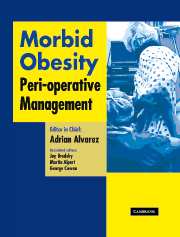Book contents
- Frontmatter
- Contents
- Contributors
- Foreword
- Preface
- Acknowledgments
- Dedication
- Section 1 General aspects
- Section 2 Pathophysiology
- Section 3 Pre-operative management
- Section 4 Peri-operative management of co-morbidities
- Section 5 Pharmacology
- Section 6 Monitoring
- Section 7 Intra-operative management
- Section 8 Post-operative care
- 25 Post-anesthetic care unit management
- 26 Respiratory management
- 27 Management of the obese critically ill patient in intensive care unit
- 28 Nursing management
- 29 Post-operative analgesia
- Section 9 Conclusions
- Afterword
- Index
25 - Post-anesthetic care unit management
from Section 8 - Post-operative care
Published online by Cambridge University Press: 17 August 2009
- Frontmatter
- Contents
- Contributors
- Foreword
- Preface
- Acknowledgments
- Dedication
- Section 1 General aspects
- Section 2 Pathophysiology
- Section 3 Pre-operative management
- Section 4 Peri-operative management of co-morbidities
- Section 5 Pharmacology
- Section 6 Monitoring
- Section 7 Intra-operative management
- Section 8 Post-operative care
- 25 Post-anesthetic care unit management
- 26 Respiratory management
- 27 Management of the obese critically ill patient in intensive care unit
- 28 Nursing management
- 29 Post-operative analgesia
- Section 9 Conclusions
- Afterword
- Index
Summary
Introduction
When managing the morbidly obese patient in the post-anesthetic care unit, similar procedures to those indicated for any other patient have to be applied, but special attention should be paid to the following factors: tracheal extubation, oxygenation, ventilation, positioning, platelet anti-aggregation and peri-operative pain management.
A preventive monitoring and careful surveillance must be carried out to early detect respiratory dysfunction, hypothermia, hemodynamic instability, thromboembolism and post-operative nausea and vomiting (PONV).
Accordingly, appropriated resources should be available for diagnosis and treatment of these complications. Difficult tracheal intubation has been observed between the obese, and this topic should be considered as a potential factor influencing in dangerous complications.
Even though, this matter remains controversial, trained personnel with the same skills and technical resources necessary for tracheal intubation during induction of general anesthesia have to be available when planning or actually performing tracheal extubation, because it may be necessary an emergent tracheal re-intubation during recovery. Obesity is associated with greater peri-operative morbidity and mortality.
The incidence of post-anesthetic desaturation is about three times higher compared to lean population. In addition, these individuals are at higher risk of pulmonary embolism, post-anesthetic nausea and vomiting and eventual gastric aspiration.
These circumstances if not properly managed could lead to life-threatening situations and other complications within which the infections stand out.
- Type
- Chapter
- Information
- Morbid ObesityPeri-Operative Management, pp. 339 - 352Publisher: Cambridge University PressPrint publication year: 2004



